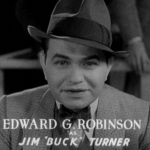 |
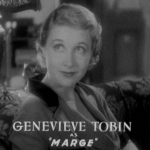 |
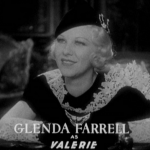 |
| Jim Turner Edward G. Robinson |
Marge Mayhew Genevieve Tobin |
Val Wilson Glenda Farrell |
| Released by Warner Brothers/First National | Directed By Alfred E. Green |
||
Proof That It’s Pre-Code
- Marge protests after her husband starts kissing her on the front lawn. “Jim, stop that! The neighbors will think we’re not married!”
- Jim once played strip poker with a lady horse owner in the stables and eventually won the horse!
- Gambling addiction: it’s an ugly reality. … kinda.
Dark Hazard: Addicted to Love
“But in this world, Turner, you’ve got to look out for number one.”
So it’s been the tradition that the last few Forbidden Hollywood sets Warner Archive has issued that one of the included movies is a morality tale– a movie about the dark underpinnings with a look at addiction or crippling social ills that the end of the pre-Code era also spelled the end to. See The Wet Parade or Ladies They Talk About.
I mistakenly thought that Dark Hazard was along those lines, a daring story of gambling addiction. And it is, for the most part. Kind of. But Dark Hazard has that wonderful pre-Code quality about it that you can never quite assume where it’s going or why. Between that and an always fantastic Edward G. Robinson, Dark Hazard is a fun movie to try and watch and unpack, kind of a weird cautionary fable– but still not quite how you think.
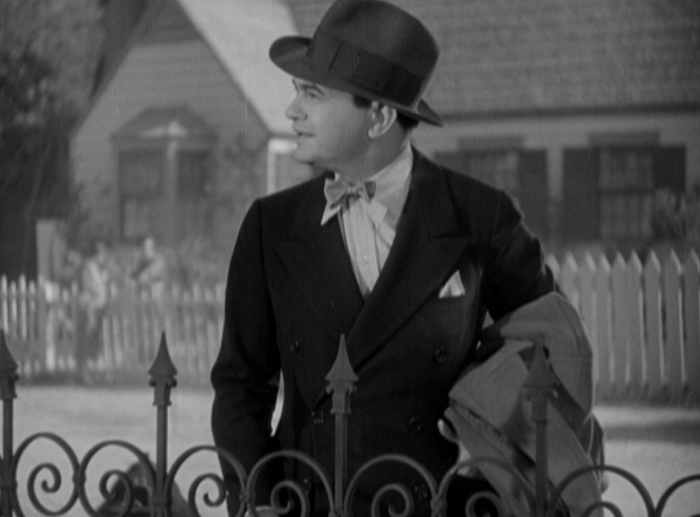
Dark Hazard is the story of professional gambler Jim Turner (Edward G. Robinson). The first scene sees him winning $20,000, and the second shows him having to borrow $5 for a cab ride home. Fortune can be cruel, but after he hits the skids, he ends up working at the very track he was once the king of. This leads to a fortunate turn of events for him, though; looking to save money, he moves into a house under the purview of the snotty Mrs. Mayhew (Emma Dunn), whose beautiful daughter, Marge (Genevieve Tobin), soon wins Jim’s heart.
Promising to go legit, Jim takes her to Chicago. He refuses to let her work, even if his job as a hotel clerk doesn’t bring in much, which makes things tough when Jim is goaded into being fired by a gangster named John Bright (Sidney Toler). Luckily, this is a pre-Code so the gangster is actually pretty swell (besides being a complete asshole– hey, he is played by Sidney Toler) and, after getting Jim drunk and gambling again, puts him in charge of a dog racetrack in California. You know, that old arrangement.
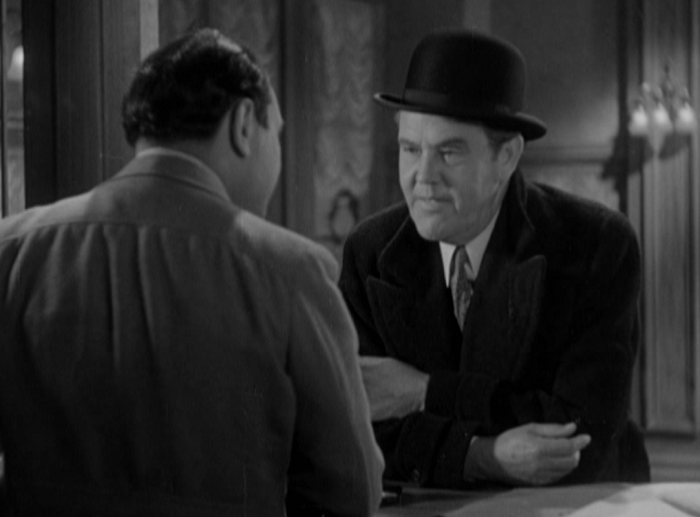
At the track, Jim makes two important connections. The first is with former flame Val (Glenda Farrell), who loves the nightlife and is more than a little bummed that Jim is out of the race for her. Then there’s also one of the dogs Jim doesn’t bet on– he’s a Greyhound named Dark Hazard.
Jim is instantly smitten with the dog’s ability to come from behind and he manifests it with an audible and physical glee. Watching Edward G. Robinson giggle and snuggle with a dog that his character connects so well to is simply sublime. Marge is unimpressed, registering with a sharp displeasure:
“I’d begin to get jealous if I didn’t think this was all so ridiculous.”
For anyone’s danger sense tingling, yes, Marge doesn’t like dogs, so this relationship would seem to be doomed. She also grows incensed as Val and the racetrack eat up more of his time and bank account; his gambling addiction has returned and by now grown out of control. When she gets pregnant, it’s time for her to split back home, leaving him to his own devices.
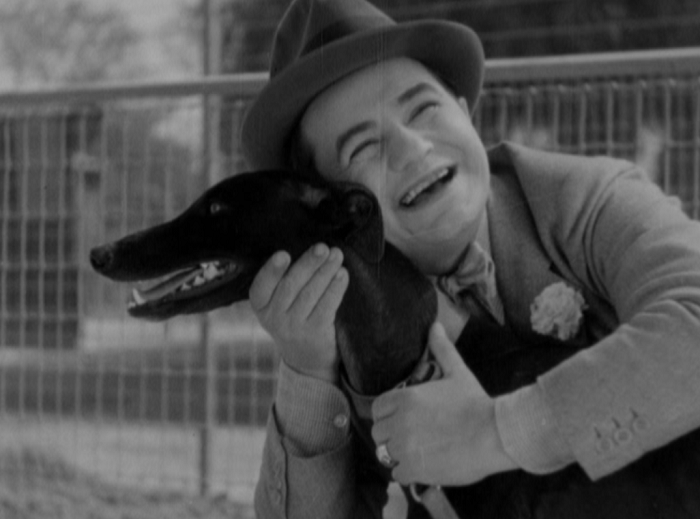
Spoilers.
It’s two years later and Jim has finally turned back up in Ohio to try and reconnect with Marge and his son. He shows up disheveled and messy– it’s obvious the years haven’t been kind. Marge has been seeing another man named Pres Barrow (George Meeker), who is pretty much the boss of that small Ohio town. Things look bad between the two until Jim agrees to reform again and works in one of Barrow’s shops.
He and Marge reconnect tentatively, but that old itch keeps itching, and soon he’s at the new dog track where he runs into none other than Dark Hazard. The dog has just broken its leg, and Jim scrounges up the money to buy him. Marge is furious, and Jim compensates by drinking. He deludes himself into thinking that the problem is Marge’s domineering mother or the feelings Marge has for Barrow, and he demands that she leave her house. She refuses, and he takes Dark Hazard and heads out onto the road again, promising the dog that things will get better soon.
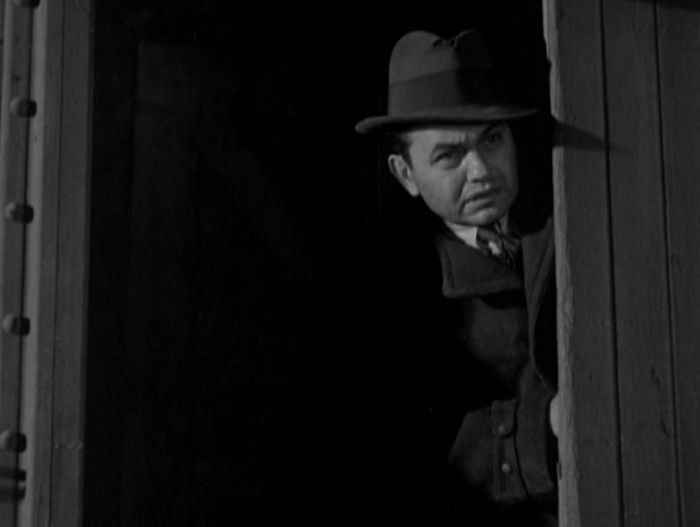
Much of Dark Hazard can easily be taken as an anti-gambling screed. Every time Jim looks like he has his life together, every time he seems to have found some slice of happiness, he heads to a track and can’t stop buying tickets. All of the friends he makes take him out gambling, and encourage him to buy more, harder, faster. Marge is long-suffering, but clearly cares for him, desperately wanting to reform him into a better person, which he desperately tries to go along with. Jim’s addiction is a long term disease, rendering him penniless and alone for years at a time. He ends up losing the wife and child he once so cherished. Gambling, it would seem, is a dark path full of misfortune.
But that is not what Dark Hazard is about.
In the film’s epilogue, we learn Jim and Dark Hazard’s fate. Managing to help the dog heal and giving it the love the dog needed, Hazard is soon one of the biggest stars in dog racing, taking Jim across not just the country but the world. He reconnects with Val, too, and she leans on him to be more responsible and to save most of his winnings. Referring to an earlier incident where she’d begged him to go to bed with her, he ratchets up a big smile and delivers the film’s final line:
“This time, honey, I won’t disappoint you!”
So gambling, that worldly social ill, is terrible and will ruin your life… and is perfectly okay?! This weird turnaround in, I kid you not, the film’s last two minutes, is startling and wonderful, even if it completely undermines a lot of the film’s drama.
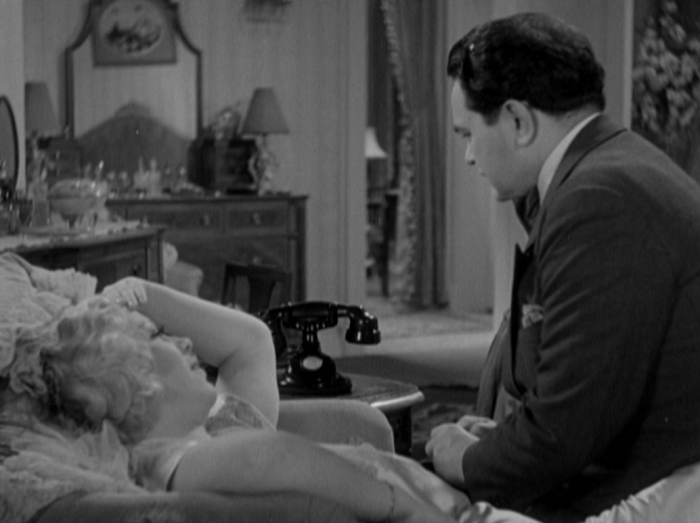
The ending completely reconfigured the movie for me, revealing the film still as a dark drama, but not in the mechanics I had been expecting. It’s not about the problems with gambling addiction, even if it’s unpleasant and sends Jim into tailspins. Instead, this movie shares that sort of queasy, incredibly playful symmetry of morality that Night Nurse has got. (When I mentioned this online before, one of my Twitter followers batted back, “What, like Night Nurse HAS a sense of morality?”, which is exactly the point!)
So what in the hell is the moral of Dark Hazard? Despite seeming like an anti-gambling preachment yarn for much of its runtime (and a good one, believe me!), with the final few minutes intact, it’s actually about picking the right woman to marry. No, really! Think about it! Marge’s problem is that she wants to reform Jim; Val simply wants to help him out and have a good time. There are hints at this when Marge decides to leave Jim; practically any other movie made during this time would have had the wife sticking with him to the bitter end, nursing him back to health and reality, A Star is Born style. Marge gives up too easy, and Val clearly wants Jim to thrive on his own terms. Marge’s preoccupations with respectability doom her marriage to a guy whose horse– er, dog– is just about to come in.
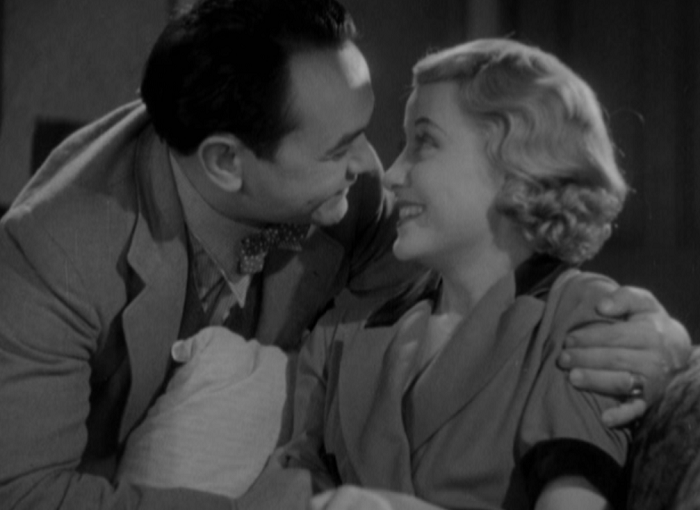
But that’s not all Dark Hazard is about, by any means. So much of the film is built around Jim’s ego– his need for status and money– and how that pushes him back to gambling in order to prove himself worthy or better than those around him. The movie reveals itself to be an ode to the fiercely independent. There’s not a boss in the film who doesn’t get a comeuppance or a telling off. Dark Hazard says you have to be your own man and make your own way in life, which is pretty consistent with much of the early Depression-era moralizing.
So, hey, if you have a gambling problem, stick with it. It’s better than working for ‘the man’, and you will probably end up rich and having wild sex with Glenda Farrell!
End spoilers.
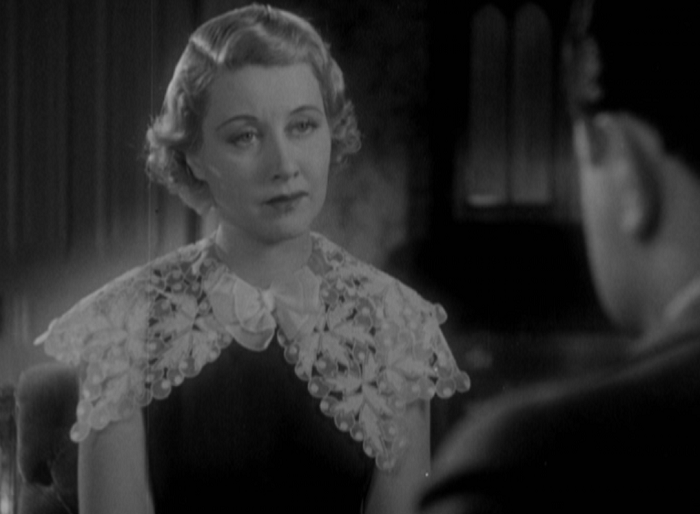
The movie does its best to connect the dog Dark Hazard to Robinson’s own fortunes. They both hit bottom together, and Jim embraces the dog as a symbol of redemption and glory. (Please note that at no point does the dog have wild sex with Glenda Farrell.) Jim desperately wants to embody that same ‘come from behind’ attitude that the dog does, and, miraculously, after a cold hard slap from reality, he does indeed manage to become that long shot.
Director Alfred E. Green (Baby Face, Smart Money) has a great handle on the dramatics of the picture, able to fluctuate between Jim’s desires for domesticity, his temper, and both the glamor and ugliness of gambling. The acting is uniformly great, with Glenda Farrell and Genevieve Tobin both turning in interesting supporting parts, and a host of Warners characters actors popping in for a few minutes. And Edward G. Robinson, well, there’s never enough nice things to say about him.
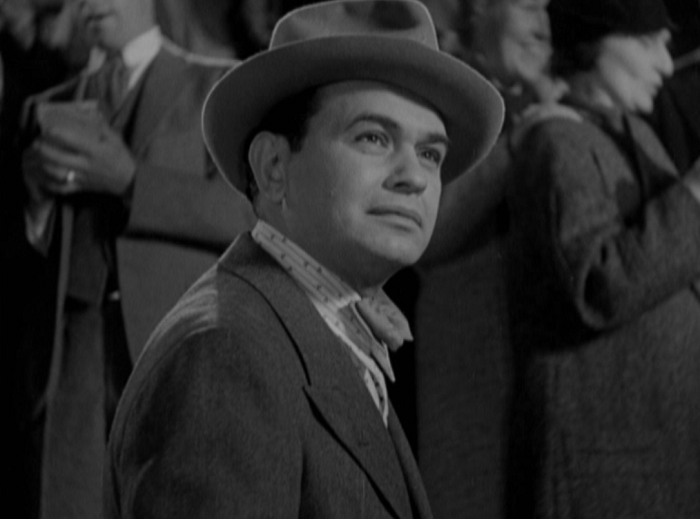
Dark Hazard is a strange movie that some people will find confusing or weird. It’s a movie that portrays a serious societal ill intimately, and then completely subverts it to give it happy ending. If you can understand why it happens, or can just accept its ludicrous twist in the spirit of hopefulness it is meant to embody, it’s hard not to enjoy the film’s plentiful charms.
Trivia & Links
- Remade as the even-more-forgotten Wine, Women and Horses (1937).
- Background music in the movie includes versions of”Pettin’ in the Park” from Gold Diggers of 1933 and “Honeymoon Hotel” from Footlight Parade.
- Cliff at Immortal Ephemera also enjoyed it, noting that the acting helped overcome the weak story. He also gives some great background:
The movie is based on a novel from W.R. Burnett, author of a more famous book previously brought to life on screen by Robinson in 1931, Little Caesar. Later novels by Burnett include High Sierra and The Asphalt Jungle. Burnett had intimate knowledge of his material when it came to Dark Hazard, as he was owner of Robinson’s co-star, the greyhound War Cry. One old clipping I found referred to War Cry as, “the Man O’ War of the dogs,” who had won forty-four races in one year, finishing out of the money only four times that season. He later sired many champions.
Awards, Accolades & Availability
- This film is available in the 8th Forbidden Hollywood collection from Warner Archive, which also includes Blonde Crazy, Strangers May Kiss, and Hi, Nellie!. You can get it from Warner Archive directly or over at Amazon. Thanks to Warner Archive for providing a review copy of the set.
Comment below or join our email subscription list on the sidebar! |
||
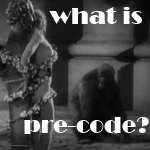 |
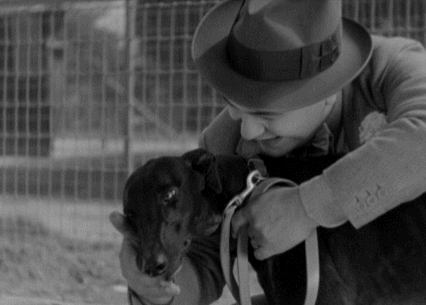 |
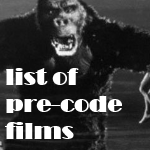 |
 |
 |
|



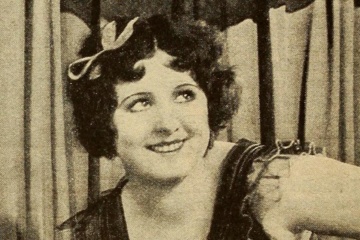
6 Comments
Vienna · January 14, 2015 at 2:38 am
Another EGR I have to catch up with. A fine review. Thank you.
Danny · January 19, 2015 at 8:26 am
Check it out if you get the chance. And enjoy!
Gretchen Young · January 14, 2015 at 3:22 pm
Have seen this one. And it is one of my fav Edward G Robinson movies.
Danny · January 19, 2015 at 8:26 am
Glad to hear it. It’s pretty unusual, but weirdly compelling.
Janet · December 6, 2016 at 3:52 pm
Danny, thanks for providing an explanation for the plot twists in this movie since I definitely couldn’t work this out myself!! I enjoyed the film and the fact that the ending was so unpredictable – one of the things I love about some pre-codes.
larry brown · December 20, 2017 at 5:32 am
Robinson and his female co-stars shine. And his over- the-top affection for ‘Hazard’ has a creepy feel. Tobin’s speech before she leaves him is rewindable several times!
Comments are closed.